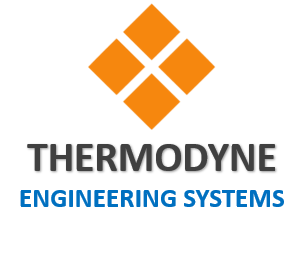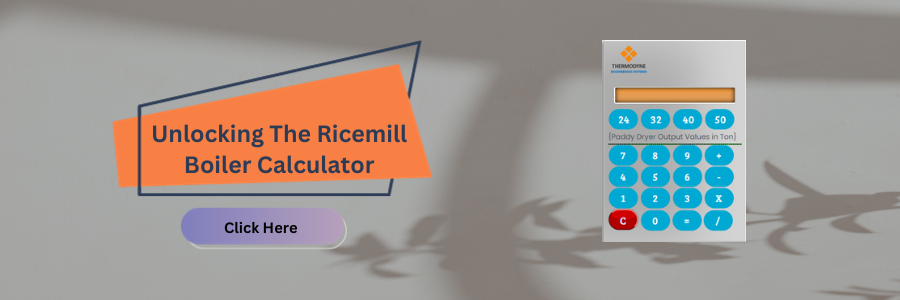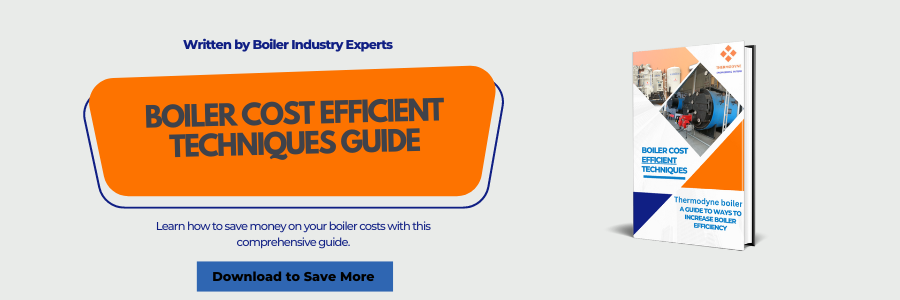Industrial boilers are essential pieces of equipment in many businesses. They provide heat for a variety of processes, including manufacturing, food processing, and healthcare. However, boilers can also be prone to problems.
Here are some tips on how to prevent and solve industrial boiler problems:
Table of Contents
Prevention Of Steam boiler
- Perform regular inspections and maintenance. This includes checking the water level, pressure, and temperature of the boiler, as well as inspecting the boiler for leaks, cracks, and other damage.
- Use the correct fuel and water. The type of fuel and water you use can have a big impact on the lifespan of your boiler. Make sure to use the fuels and water that are recommended by the boiler manufacturer.
- Monitor the boiler’s performance. This includes keeping an eye on the boiler’s efficiency and output. If you notice any problems, take action immediately to prevent them from getting worse.
- Keep the boiler clean. A dirty boiler is more likely to have problems. Make sure to clean the boiler regularly, according to the manufacturer’s instructions.
Solution Of Industrial boiler Prevention
If a problem does occur, it’s important to identify the problem and take action to fix it. Here are some common boiler problems and how to solve them:
- Leaks: If you have a leak, it’s important to find the source of the leak and fix it as soon as possible. Leaks can cause water damage to the boiler and the surrounding area.
- Burner problems: If the burner is not working properly, it can cause the boiler to not produce heat. Check the burner for problems such as clogged fuel lines, dirty burners, or faulty igniters.
- Scale buildup: Scale buildup can reduce the efficiency of the boiler and cause it to overheat. You can prevent scale buildup by using a water treatment system.
- Corrosion: Corrosion can damage the boiler’s interior and cause it to leak. You can prevent corrosion by using a corrosion inhibitor.
By following these tips, you can help to prevent and solve industrial boiler problems. This will help to keep your boiler running smoothly and efficiently for many years to come.
Here are some additional tips for preventing and solving industrial boiler problems:
- Train your employees on how to operate and maintain the boiler. This will help to ensure that the boiler is operated properly and that any problems are identified and addressed quickly.
- Have a spare boiler on hand. This will allow you to continue operations if the primary boiler breaks down.
- Establish a maintenance schedule and stick to it. This will help to prevent problems from developing in the first place.
- Have a qualified boiler technician inspect the boiler regularly. This will help to identify any potential problems before they become serious.
How to Prevent by Boiler Trouble Using Six Basic Boiler Problems
Boiler efficiency can be increased up to 90% by proper maintenance of the systems.
Some of the common problems hinder the boiler’s ability to produce output to its full capacity.
They are under-
1. Priming:
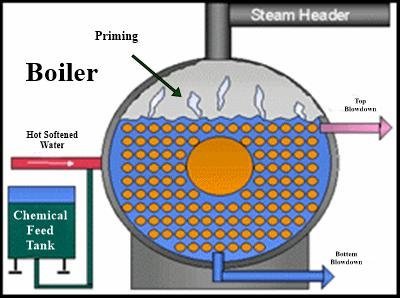
When the steam is produced in the boiler, some droplets of water get carried away with the steam resulting in the formation of ‘wet steam’. This phenomenon is termed priming.
Priming is a condition in which water droplets are carried along with steam from a boiler. This can be caused by a number of factors, including:
- High water level in the boiler
- Improper boiler construction
- Sudden fluctuations in steam demand
- Impurities in the boiler water
Priming can have a number of negative effects, including:
- Reduced steam quality
- Increased corrosion and scaling
- Damage to valves and other equipment
- Increased risk of explosion
There are a number of steps that can be taken to prevent priming, including:
- Maintaining a proper water level in the boiler
- Using a boiler with a design that minimizes priming
- Avoiding sudden fluctuations in steam demand
- Treating the boiler water to remove impurities
Problem:
- Deposits on the valves may cause overheating and boiler corrosion
- Reduced product quality which affects the heat transfer rates
- Higher steam consumption for the same power output
- The life of a boiler and its components are subjected to danger
Cause:
There are two main causes for priming to occur in a boiler:
Mechanical Causes:
- Improper design of boiler shell
- Too high a water level
- Incorrect firing rate
- Boiler operating at a steam pressure below the design pressure
Chemical Causes:
- Presence of oil and organic matter in the boiler water.
- Suspended solids in boiling water.
- Highly alkalinity
- Soap-like structures in boiler water
Solution:
- Maintain low levels of salts in the water
- Efficient filtration of water used in the boiler
- Blow off the sludge from time to time
- Controlling rapid changes in the flow velocity
2. Foaming

Foaming is the formation of bubbles in a liquid. It is caused by the presence of surfactants, which are molecules that have one end that is attracted to water and one end that is attracted to air. Surfactants form a film around the air bubbles, which prevents them from merging and forming larger bubbles.
Problem:
- Formation of soap like structures reduces the surface tension of water significantly, thus decreasing the boiler efficiency.
- Fluctuation in water levels.
- Water hammer problem.
- Can lead to contamination and scaling.
Cause:
- Presence of various chemicals (especially alkalis and oils) and solid constituents in the boiling water. These oil and alkali constituents react to form soaps, which in turn lowers the surface tension thus increasing the foaming tendency.
- The lubrication used in boilers serves as a source of oil, which is the primary source behind the effect of foaming.
- Formation of small bubbles at the water surface, which do not break easily.
Solution:
- Use of Anti-foaming agents such as castor oil. (Anti-foaming agents neutralize the effects of surface tension)
- Proper treatment of water before entry into the boiler in order to remove the foaming agents (such as oil, alkali)
- Addition of sodium aluminates has proved to be an effective way to remove oil traces by entrapping oil drops.
3. Carry-over
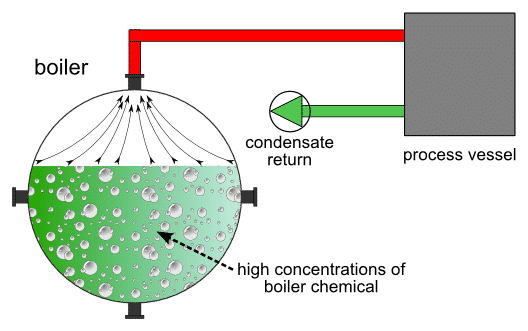
Carry-over is a term used in a variety of contexts to refer to the transfer of something from one situation to another. In accounting, carry-over refers to the transfer of a balance from one accounting period to the next. In mathematics, carry-over refers to the process of adding numbers that are greater than 9, in which the units digit is carried over to the next column. In psychology, carry-over refers to the transfer of learning from one task to another.
Problem:
- The decrease in the efficiency of a boiler as the dissolved salts and solid particles have chances of getting carried away into the turbine blades and finally getting deposited over the blades.
- Life of different parts of a boiler subjected to such water-soluble salts is at stake.
- A judgment of actual height of water column becomes difficult, making maintenance procedure quite troublesome
- Carry-over poses a serious problem to the parts such as turbine blades, steam traps, valve bodies, etc.
Cause:
- Presence of soluble alkaline salts in the boiler water
Solution:
- Ensure proper feed water treatment
- Expert advice of a chemist should be considered regarding the boiler and feed water treatment
- Main steam stop valve should be opened gradually.
- Maintain lower water levels.
- Use anti-priming baffles.
- Leakage of any ‘foreign’ material into the boiler feed water system should be avoided.
- Alignment of gauge glasses should be properly done.
4. Scale
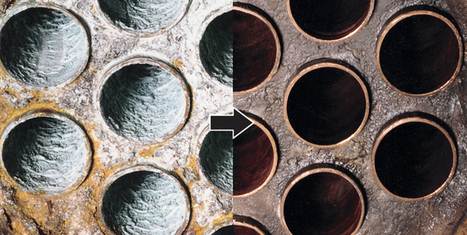
A layer of water formed over the metal surfaces of the boiler is termed a scale. Scales are salts of Calcium and Magnesium (existing primarily in the form of sulfates or carbonates), which are highly insoluble in water.
Problem:
- If there is scaling in the boiler, then the amount of fuel required to produce the same amount of steam may increase considerably in comparison to a boiler without scales.
- Sodium sulfate is a strong electrolyte so it dissociates with water Its conductivity is about one hundredth to that of steel thus causing hindrance in the heat flow. Even a thin layer of this scale on the metallic surfaces may reduce the boiler efficiency by, upto 20%.
- The scaled boiler becomes increasingly hotter due to resistance in heat flow, so this metal will become more prone to deformation and rupturing.
- The heat transfer in the boiler is reduced due to the layers of scale that act as an insulator.
Cause:
Solution:
- If the scales adhere loose to the surface, a wire brush or scraper can remove them.
- Thermal shocks may remove the “brittle” natured scales.
- Frequent blow-down operations can be benefic in removing scale which is loosely held on to the surface of the boiler.
- Hard scales require chemical treatment. For e.g. Calcium Sulphate scales can be removed by adding EDTA(Ethylenediaminetetraacetic acid).
5. Corrosion:
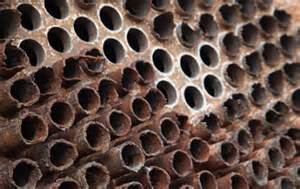
Corrosion in a boiler is the deterioration of the boiler’s metal parts due to chemical or electrochemical reactions with water or steam. It can cause significant damage to the boiler, leading to reduced efficiency, increased maintenance costs, and even catastrophic failure.
There are a number of factors that can contribute to corrosion in a boiler, including:
- The type of metal used in the boiler
- The quality of the water used in the boiler
- The operating conditions of the boiler
- The presence of impurities in the water
Problem:
- The boiler metal gets eaten up quickly due to the action of dissolved oxygen leading to complete failure of the boiler system.
- Increase in cost of maintenance and repairs.
- Leaking of rivets and joint areas.
- Reduced boiler life and possible chances of failure of the entire system.
Cause:
- The dissolved oxygen (about 8ppm at room temperature) sets free as the water is heated. This dissolved oxygen then reacts with the iron of the boiler to form a ferric oxide (known as rust).
Solution:
- Addition of Hydrazine/ Sodium Sulphite/Sodium Sulphide.
- By mechanical aeration under high temperature and vacuum conditions.
6. Reduced stack temperature
excess air reduces the temperature not only of the furnace but also of flue gases in the chimney. As heat taken by the air reduces the flue gas temperature, which can create a problem for stack temperature management. The chimney temperature below the ADP(Acid Dew Point) leads to the formation of condensation of sulphuric acid vapor and causes corrosion to form. This reduces the lifespan of ID fans, ducting, chimneys, etc.
Solution:
After calculating the stoichiometric air required for complete combustion, a surplus amount of air is estimated and according to which a synchronous arrangement of FD/ ID fan and damper in the chimney has to be made.
Thermodyne Boilers advises all boiler users to thoroughly read this write-up so that they can use their boilers effectively and efficiently.
Prevent and Solve Industrial Boiler Problems FAQ
1. The most common boiler troubles include:
The pilot light keeps going out
The boiler is making noises (gurgling, whistling or banging)
No heating or hot water
Boiler is leaking
Low boiler pressure
Radiators are cold
Boiler is kettling
Boiler not responding to the thermostat
Frozen condensate pipe
Boiler keeps switching off
The causes of boiler troubles can vary depending on the specific problem. However, some common causes include:
Low water level
Clogged filters
Debris in the pipes
Faulty thermostat
Faulty pump
Leaking valves
Burned-out pilot light
Corrosion
Scale buildup
There are a number of things you can do to prevent boiler troubles, including:
Have your boiler serviced regularly by a qualified technician
Flush your boiler annually
Drain your condensate trap regularly
Check your water pressure regularly
Keep your filters clean
Inspect your pipes for leaks
Replace your boiler when it reaches the end of its lifespan
If your boiler has a trouble, the first thing you should do is turn it off. Then, you should try to identify the cause of the problem. If you can’t identify the cause, or if you’re not comfortable fixing the problem yourself, you should call a qualified technician.
If you don’t fix boiler trouble, it can lead to a number of problems, including:
Reduced heating and hot water
Increased energy bills
Damage to your home
Carbon monoxide poisoning
Fire
The cost of fixing boiler trouble will vary depending on the specific problem. However, in general, it is less expensive to fix a problem early on than to wait until it becomes a major issue.
Having your boiler serviced regularly by a qualified technician can help to prevent problems and extend the life of your boiler. A service technician will check your boiler for leaks, clogged filters, and other problems. They will also flush your boiler and clean your condensate trap.
The average lifespan of a boiler is 15-20 years. However, some boilers can last for much longer, and others may need to be replaced sooner.
There are two main types of boilers: gas boilers and oil boilers. Gas boilers are more common in homes, while oil boilers are more common in commercial buildings.
The main difference between a gas boiler and an oil boiler is the fuel that they use. Gas boilers use natural gas, while oil boilers use heating oil. Gas boilers are generally more efficient than oil boilers, but they can also be more expensive to operate.
